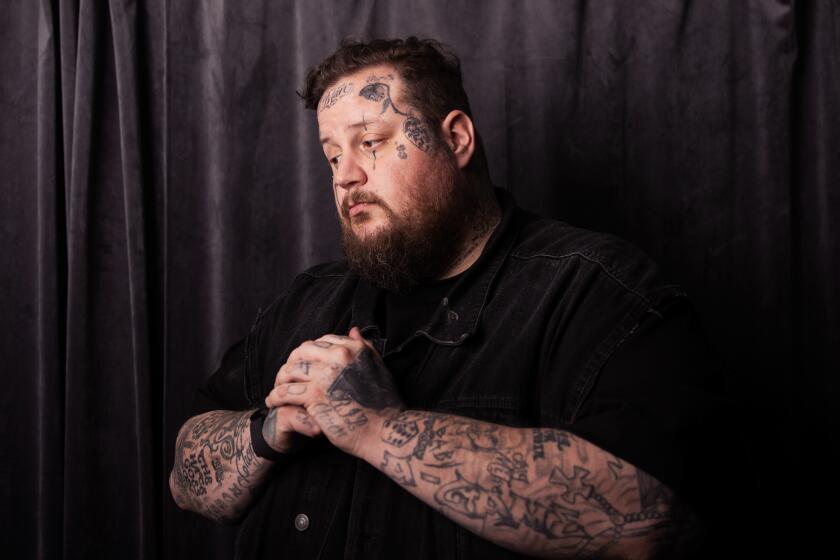John Barry: A Composer With Whom Listeners Seem to Bond
- Share via
Veteran film composer John Barry receives the Palm Springs International Film Festival’s Frederick Loewe Award on Saturday night--the latest in a series of honors for the Englishman who’s won five Oscars, for the music of “Born Free” (song and score), “The Lion in Winter,” “Out of Africa” and “Dances With Wolves.”
His other films include such classics as “Midnight Cowboy” and “Body Heat.” But it’s his work on the early James Bond movies--including “Goldfinger” and “Thunderball”--that probably earned him the most fame.
Lyricist Hal David, who worked with the composer on “On Her Majesty’s Secret Service,” “Monte Walsh” and “Moonraker,” will present the award to Barry at the Palm Springs Convention Center. Vocalist Jennifer Holliday is scheduled to perform “Goldfinger” with the Les Brown band. (John Travolta, Debbie Reynolds and Jack Valenti are also being honored at the festival, which runs through Jan. 18.)
Reached at his home on Long Island, Barry said he was flattered by the honor and that, in fact, he met Loewe on several occasions in London during 1970-71 while he was working with Loewe’s longtime partner, Alan Jay Lerner, on the short-lived stage musical “Lolita, My Love.”
Barry, 65, is back in vogue these days. He is the subject of two current books (“John Barry: A Life in Music” and “John Barry: A Sixties Theme”); his Bond themes are currently being covered by rock artists from Propellerheads to Iggy Pop; and a recent concert in London’s Royal Albert Hall--the first time he had performed in public in nearly 25 years--sold out in a matter of hours. Barry was also recently inducted into the Songwriters Hall of Fame.
Asked to explain his renewed popularity, Barry said that he’s been told that when today’s young rockers “were 9 or 10 years old, their dads took them to see Bond movies; it got to them somehow, and they hark back to that as some kind of original inspiration.”
Barry himself started as a rock ‘n’ roller in Britain in the late ‘50s, but it was his exciting, often exotic music for the 007 films that catapulted him to fame in the ‘60s. His musical diversity became apparent in jazz scores like “The Knack” and choral work, in “Mary, Queen of Scots.”
He gradually shifted to a more romantic sensibility, as heard in his music for films like “Somewhere in Time,” “Out of Africa” and “Dances With Wolves” (all of which went platinum as soundtrack albums).
His current movie is “Playing by Heart,” which The Times’ Kevin Thomas praised for its “mood-enhancing score.” Scheduled for release Feb. 23 is “The Beyondness of Things,” his first non-film album in more than 20 years. Its 12 instrumental themes are based on, in the composer’s words, “dreams, memories and reflections” from throughout his life.
“Beyondness”--an otherworldly title that Barry says he ran across years ago and always kept in his mind for some future project--is the first of a three-record deal with Universal Classics & Jazz (formerly PolyGram). All will be original concept albums.
Label President Chris Roberts describes the hard-to-characterize “Beyondness” as “romantic, symphonic music.” He explains: “I see orchestral music in film scores as today’s classical music. I don’t really make a distinction. I think John is a contemporary composer, period. He works in different mediums: He might score a film or he might write on some thematic basis, like ‘The Beyondness of Things,’ without any context of visual image. To me, they’re all part of the same creative muse.”
Next up for Barry is an as-yet-untitled collection of songs and dances based on the writings of Irish-born spiritual philosopher John O’Donohue (author of “Anam Cara: A Book of Celtic Wisdom”), for which Barry hopes to line up “several major names” to perform the vocals.
Barry has undergone a number of significant life changes in recent years. His esophagus ruptured in 1988 when he had a toxic reaction to a beverage, nearly killing him. Four major surgeries and one administration of last rites later, Barry survived and, after a two-year layoff, returned with the rich symphonic score for “Dances With Wolves.”
Barry’s new record deal allows him--for the first time after nearly 40 years of movie work--the chance to compose, unfettered by restrictions of time and subject. He admits, however, that after 120 films, “the cinema gets in your blood. So if an interesting and thoughtful movie is presented,” the album projects will go on hold pending completion of a new film score.
Last year’s concert success has led to additional concert dates in Birmingham and London in April, with talk of a possible American tour in 2000. Asked about his career arc, he says: “I never had any concept of any kind of journey. There was no grand plan. It just happened.
“Looking ahead to the next 10 or 15 years,” he adds, “I’m so excited about this diversification and the feeling of freedom about what I can do.”
More to Read
The biggest entertainment stories
Get our big stories about Hollywood, film, television, music, arts, culture and more right in your inbox as soon as they publish.
You may occasionally receive promotional content from the Los Angeles Times.










